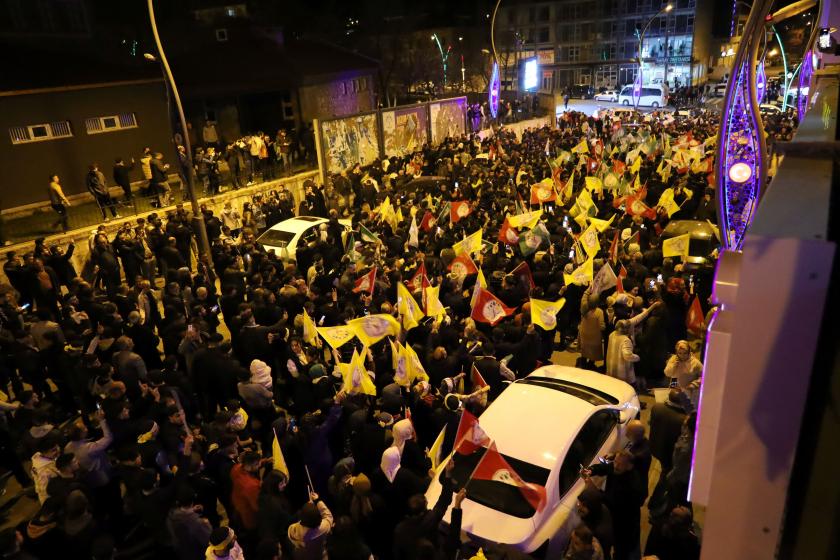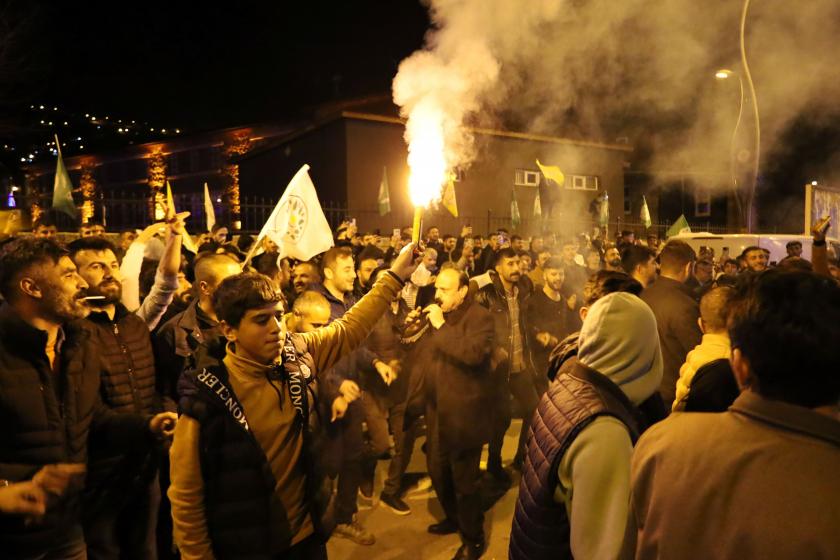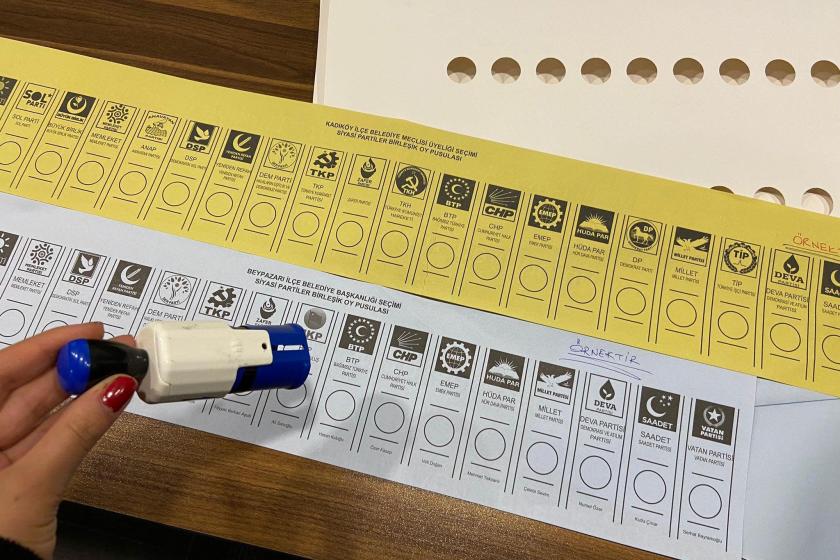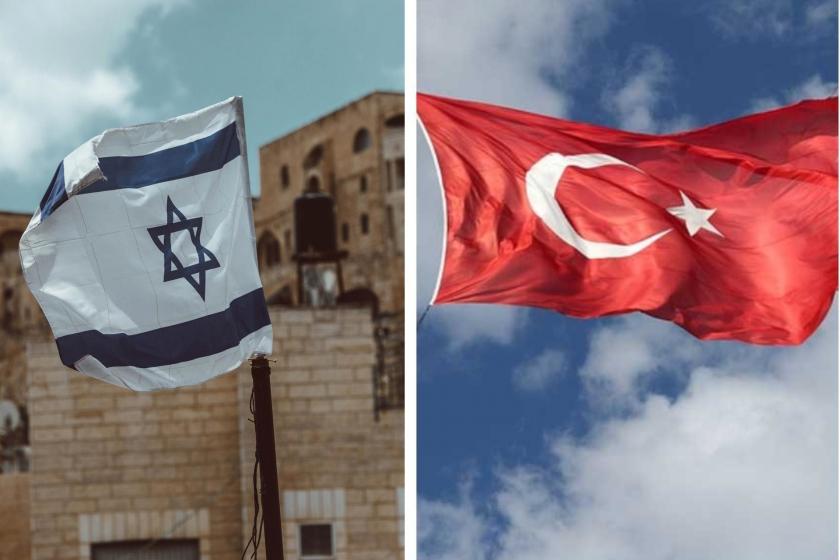Fulya Atacan: A new period of upheaval in the Middle East
Professor Dr Fulya Atacan: If the ‘bringing into line’ extends to Turkey, it might bring the government down. This is what worries AKP.
15 June 2017 07:56
Professor Dr Fulya Atacan: If the ‘bringing into line’ extends to Turkey, it might bring the government down. This is what worries AKP.

Serpil İLGÜN
The Qatar crisis of last week is likely to deepen and continue to dominate the agenda on the world stage. Saudi Arabia, Bahrain, Egypt and the UAE were first to declare that they will cut all economic and political ties with - the small but petrol-rich - Qatar on 5 June. This number has now increased to 12 countries with Yemen, Libya, the Maldives and Niger joining them at the weekend.
What are the real factors in this crisis? What is the background to the claims of “Qatar is housing terrorists, financing terrorist activities, has secret relationships with Iran”? Why is Qatar footing the bill, when other Gulf countries, such as the UAE, have a much larger volume of trade with Iran. What does it mean in terms of the new US Middle East policy that the crisis surfaced soon after Donald Trump’s visit to Saudi Arabia?
We discussed the background of the Qatar crisis with Professor Dr Fulya Atacan, known for her studies on the Middle East, Islamism and Islamic congregations. Atacan is one of the Academics for Peace; one of 1128 signatories of a petition released in January 2016 calling for an end to violence in the south-east Turkey). She was sacked from her role in the Political Sciences and International Relations Faculty at Yıldız Technical University on 7 February under a decree by the power of law (KHK) under the continued State of Emergency (OHAL).
Let’s start with your views on the economic and political siege of Qatar. How did the crisis start?
I cannot quite understand why they are so ruthless on Qatar. I believe most people haven’t either. I do think two important points must be the focus on. The first is to achieve unity against Iran; Saudi Arabia is leading on this and the US support is clear. The second is to create a uniform block against some Islamic movements.
According to some media ‘strategists’, two dominate Islamic powers in the area are locked in conflict and the other side is trying to suppress Iran. This is a very shallow argument.
Why is it shallow? What is the main motive in suppressing Iran?
There is a very important aspect; Saudi Arabia has a serious Shiite problem as it has a Shiite population. The majority of the population in Bahrain is Shiite and other Gulf countries also have Shiites in their population. Iranian Islamic Revolution in 1979 was a big threat to the region; they were worried about the potential for the Khomeini perspective mobilising their Shiite population with citizenship problems and bring down the monarchies. This was understandable and the source of opposition to Iran. We are faced with the same issue today.
This was not discussed much in Turkey but during the Arab Spring of 2011, there were also uprisings in the Gulf countries. For example, Saudi Arabia (with the help of the Gulf Cooperation Council) sent soldiers to help quell the uprising in Bahrain, claiming it was a Shiite uprising provoked by Iran. Yet, the demand in Bahrain was equal citizenship. They didn’t even want to topple the monarchy; they asked for a more democratic system and the eradication of the inherent discrimination within the system. It was inevitable that the rebels were Shiites as the majority of the population is. It was easy to explain this as “Iran’s provocation” to the outside and if you remember Turkey said nothing. They took the same side as Saudi Arabia. Furthermore, it is felt deeper in Saudi Arabia in comparison to other Gulf states due to Wahhabism. Wahhabism does not except Shiism as Islam; there is also a religious attitude that is very harsh in dealing with Shiites. This religious attitude legitimises discrimination.
Hence, while they target Iran, they also suppress the demands of their own Shiite population…
Yes. Attempts to assimilate the Shiite population has always been a tense affair. Shiite movements were closer to more left-wing movements during the 60s and the 70s but stood closer to Islamic movements towards the end of the 70s. However, faced with inherent discrimination within the Saudi population and the state apparatus, their main demand is equal citizenship. It is very hard for the Saudi leadership to meet this demand as it is not possible to balance it with Wahhabism. That is why the Bahrain uprising was seen as a primary threat; that is why they see Yemen as a threat today. Hence, while the Middle East is in upheaval, Saudi Arabia is turning its internal problem into a regional one and suppressing internal demands for equal citizenship claiming “Iran’s interference”.
But why is this carried out over Qatar? Following his ‘Anti-Islamic’ election campaign, succeeded by his first presidential action to deny visas to travellers from 7 Islamic countries; it was argued that Trump making his first international visit as president to Saudi Arabia would, as well as securing an arms deal, lead to repercussions in Iran. Why was Qatar the target but not Iran? What is behind the stated reasons?
The main concern is to encircle Iran, push Iran to take back its steps in Syria and Iraq. Beyond that, to encircle Russia. Therefore, we need to see Qatar in the light of many layered conflicts. When we look at the first layer we see a conflict between Qatar, Saudi Arabia and many other Gulf countries but in reality, it is a conflict where many layered conflicts are crystallised. That is why the bombings in Iran must alarm everyone. It is extremely dangerous…
In this context, how should we read the ISIS attacks on the Iranian Parliament and the Khomeini Shrine and in Karbala, following the Qatar crisis?
This shows that we enter a period of renewed upheaval, killing and bombing. Yes, ISIS hat took responsibility for the bombings in Iran but the bombers were Iranian citizens.
Why is this important?
It is important because it could mean that ISIS has conscripted Sunni Iranians. This an altogether different problem for Iran. Yes, Iran said, “This was done by Saudi Arabia, they will be made to pay, our revenge will be bitter”. But it wasn’t Saudi individuals who did it; it was Iranians. This rings other alarm bells. The Middle East is a very tangled, many layered and complicated area of conflict. And unfortunately, it is the peoples of the Middle East that pay the price.
The US has been aiming to create a block against Iran, Russia and Syria since the beginning of 2012. Egypt, Saudi Arabia, Israel and Turkey were seen vital to this attempt. It seems the problems between three of them are almost completely solved; the only persistent problem seems to be Turkey. Turkey made peace with Israel; despite some minor conflicts, the relationship with the Saudis is not bitter; there are some issues with Egypt but we are open to economic activity. If you put Sisi aside, there is no distinct disagreement. As such, this axis is almost completely established.
Some claim that the Qatar crisis can be concluded as a restricted exercise in re-alignment yet some argue that a Sunni-Shiite war is more likely than ever before. Do you think the likelihood of this is increased?
Religion is always very effective in manipulating events ideologically. Especially in civil wars, you start forgetting the real reasons after a while and it turns into a Sunni-Shiite conflict. That is why the bombings in Iran are very dangerous and concerning. If it continues on this course it will escalate; yet another disaster for the peoples of the region.
Let’s look at the reasons stated… How can we explain Saudi Arabia, known all around the world as a country that supported the rise and the development of organisations such as Al-Qaida and Al-Nusra, accusing Qatar of supporting terrorism?
This where the second dimension of the crisis, the concern to create a uniform block against some Islamic movements, comes into play. It seems that the main target is the Muslim Brotherhood and all its organisations, not only in Egypt but in all Arab countries. Saudi Arabia had problems with the Brotherhood in the past, it still has. Hence this is an attempt to push back against this movement, to control it. There are members of the Brotherhood in Qatar but Hamas is emphasised.
Why is Saudi Arabia so worried about Hamas?
The explanation is not the fact that it worries the Saudis but Israel! Hamas effects Egypt through the indirect pressure it receives because of Gazza but Hamas is primarily the problem of Israel.
Hamas and the Muslim Brotherhood are singled out rather that the likes of Al-Qaida. Hamas declared its new political line last month; their decision to support a Palestine within 1967 borders is taken as the ‘green light’ for a two-state solution with Israel. On the other hand, The Egyptian Ikhwan last year declared its intention to ‘separate political and religious activities’. At the same time, the Congress of En Nahda took place in Tunisia and Rashid Al-Ghannushi stated their desire to abandon political Islam and become ‘democrat Muslims’. In summary, Hamas and the Muslim Brotherhood declared their intention to take the path of ‘democratic political Islam’ but this did not prevent them from being placed at the top of the list. Why?
There is no logic, as there is no uniform organisation in the Arab world. Yes, it is true that the Syrian Ikhwan, Palestinian Ikhwan, the Egyptian Ikhwan, etc. exist but they are all autonomous and can act very differently. Hence, it is not possible to speak of a Muslim Brotherhood that is uniformly widespread and acting in unison.
There are no representatives of the Muslim Brotherhood on the list. It is clear that Egypt had a hand in drawing up this list. We know of the conflict between Sisi and the Brotherhood; it continues and most of the members and leaders of the Brotherhood are still in prison. So, the names from the Brotherhood on the list were selected; we should be aware of why some were chosen over others. The list was given to Qatar, demanding it “seizes its relations with the organisations on it” is also a selective list. It is certain that allies of Saudi Arabia influenced the list. But this is not the final list; it will change. The last four-five years have shown that this is a period where alliances are easily formed and dissolved. You could see a new list next year. Some of the today’s allies could tomorrow be blamed for supporting terror.
CHP (Republican Peoples’ Party of Turkey) criticises AKP saying “a terrorist organisation’s sign is a part of your legislation”. AKP responded with “our ‘Rabia’ has nothing to do with the Muslim Brotherhood, ours mean one state, one flag, one country, one nation” but the ‘Rabia sign’ (a hand gesture used to show solidarity with supporters of the Muslim Brotherhood) is an important image in their external politics. The listing of the Muslim Brotherhood and Hamas by the coalition, led by Saudi Arabia, as terrorist organisations led to statements of ‘the Rabia sign is dead’. Do you agree? How will this situation reflect on the AKP-Hamas-Muslim Brotherhood relationships?
Firstly, considering the Salafi-jihadi organisations that it supports, Saudi Arabia is in no position to label anyone as terrorists! In redefining the ‘Rabia sign’, AKP internally separates itself from the Brotherhood and externally tells the Arab world that it supports Ikhwan and does not recognise the Sisi coup. AKP attempts to make this symbol useful does not seem to be successful within the population of Turkey. As I said, the Brotherhood is not a uniform organisation and the primary organisations targeted are Egyptian, Palestine and Libyan Ikhwan. The reflection of this in Turkey means a situation of high tensions with limited room for manoeuvre. We’ll have to wait and see who will make concessions and by how much.
As you know, a dream of the ‘unity of the Muslim ummah’, led by Erdoğan, has become one of the main elements of the new-Ottoman politics pursued by AKP. Erdoğan continues to give the message that ‘Turkey is the hope of the Islamic world’. Considering how far he has been pushed to the periphery and an Islamic world of increasing conflicts and constantly changing alliances, how sensible is it to speak of the unity of the Muslim ummah? And who makes up the ummah? Are the Shiites a part of it?
Achieving unity of the ummah is an old dream but it is only that; a dream. Still, this dream can be used to appeal to especially the conservative circles. It has no reality beyond that. Shiites aren’t necessarily a part of this ummah in Sunni circles. Furthermore, there are a few other countries that see themselves as the “hope” of the ummah.
In terms of Turkey’s position, the increased open and undisclosed economic relationships with Qatar were already a subject of discussion. Erdoğan’s support for Qatar was explained through these economic relationships. What do you think of this support for Qatar, criticised by the opposition?
Turkey has been dancing around this issue and not very successfully for a long time. I think Erdoğan’s fears are triggered by recent developments. We have issues with the Western block and the US, we are isolated on all fronts, nothing is as we planned, we will then turn to Russia and Iran but we know that is not easy either… Due to experiences in previous conflicts, the Erdoğan administration is a bit more careful in this Qatar crisis. They are not taking a direct stance against the Saudis or the US; a position that could allow changing its allegiance away from Qatar.
What would the consequences of turning away from Qatar be? What would be the cost of giving in to the US and the Saudis? Is it possible to follow a line that balances relationships with the likes of Russia, the US, Iran and the Saudis?
These are valid questions. It is not possible to please everyone; if this what Turkey is trying to do, it is a futile attempt. It is not easy to just say “I’ve changed my mind, I am leaving this side (Western-NATO block) and going to the other side (Russian block)”. I am sure decision makers are well aware of this; even if they are not, they will be made aware.
And you will be served with the bill...
Indeed, the ‘bringing in line’ is also a cutting down to size. This is what Qatar is experiencing now.
The charges of ‘supporting terrorism’, etc. brought against Qatar today could also be used against Turkey tomorrow as it also has skeletons in its closet. Is this what worries the AKP leadership?
There is no one in the region that doesn’t have skeletons in their closet. There is enough for anyone to use against another. However, this is not what reawakens the fears; we know it, everyone else knows it, governments know it. I gather the fear factor is an extension to Turkey and how this could bring down the government. Once this fear is reawakened your actions are determined by it. Another factor that feeds this fear is the independence of Kurdistan. You might be aware that the Kurdistan Regional Government in Iraq determined a date for a referendum on independence. The announcement that it will be held on 25 September drew a very sharp response from Turkey.
We should also mention that all this is happening during the Raqqa operation, which is claimed to be heading for a positive result. It is claimed that post-Raqqa the balances in the region will not be so unpredictable and lines will be clearer…
Maybe. The key issue is who will control the region once ISIS is removed? What kind of structure will be formed in Syria? The struggle for this is already taking place. We are not aware of many discussions and co-operations that may exist. We use guesswork to determine what might happen. It is a fight over who will have control and where.
AKP co-operation with Qatar, the Saudis or other Gulf countries is determined by the Kurdish policy. Is this fact overlooked in current analysis?
Developments in Iraq and Syria are of first-degree concern for Turkey, due to the Kurdish issue. However, this does not necessarily mean that the whole Middle East policy is linked to the Kurdish issue. I said earlier that we are in a period of multi-layered conflicts. One conflict will not be the sole determinant of a policy. However, it is true that the establishment of an independent Kurdish state in Iraq will take precedence over Qatar in the case of Turkey. On the other hand, you are also well aware of our relationship with Barzani; they might also not want to damage that.
You mean Erdoğan could change his reaction to the referendum?
If the conditions change, maybe. Let’s think back to the belittling of Barzani in Turkey. Has Barzani been met by government officials? Has he now become our best ally? If we spoke of this possibility back then we would have been told “No, not possible. Turkey has its red lines and this cannot be accepted”. We need to be aware that these are extremely transient alliances and conflicts; there is no conflict that reached its ultimate end. We are trying to make sense of this transitional period. Hence, some things look like they can never happen or certain to happen; when we look back we see that what is deemed impossible have happened and vice versa.
What could Turkey do to minimalize the effects of the fire in the Middle East?
I am not sure there is a possibility of reducing the effect for Turkey at this point. Many co-operations and actions took place during this period, with some gains and losses. They all come at a cost. Hence, I am sceptical that you can say “I will just stand aside now and do not deal with these costs”. How can we avoid this disaster? I think the only way is a free society. Secretive societies where no one knows or discusses why, how and by whom decisions are taken are condemned to live with the consequences of disasters. Only through a free discussion can you get the potential and the opportunity to for creative solutions. Is this possible for Turkey? I cannot say that I am hopeful in the short term.



